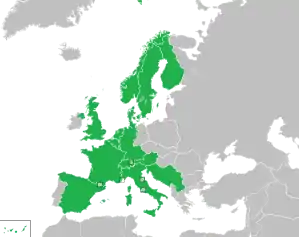Eurovision Song Contest 1962
The Eurovision Song Contest 1962 was the 7th edition of the annual Eurovision Song Contest. It took place in Luxembourg City, Luxembourg, following Jean-Claude Pascal's win at the 1961 contest in Cannes, France with the song "Nous les amoureux". This was the first time Luxembourg hosted the event. The contest was held at the Villa Louvigny on Sunday 18 March 1962 and was hosted by Mireille Delannoy. Sixteen countries participated in the contest – the same that took part the year prior.
| Eurovision Song Contest 1962 | |
|---|---|
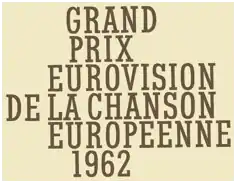 | |
| Dates | |
| Grand final | 18 March 1962 |
| Host | |
| Venue | Villa Louvigny Luxembourg City, Luxembourg |
| Presenter(s) | Mireille Delannoy |
| Musical director | Jean Roderès |
| Directed by |
|
| Host broadcaster | Compagnie Luxembourgeoise de Télédiffusion (CLT) |
| Interval act | Achille Zavatta |
| Website | eurovision |
| Participants | |
| Number of entries | 16 |
| Debuting countries | None |
| Returning countries | None |
| Non-returning countries | None |
Participation map
| |
| Vote | |
| Voting system | Ten-member juries awarded points to their three favourite songs. |
| Nul points | |
| Winning song | "Un premier amour" |
The winner was France with the song "Un premier amour", performed by Isabelle Aubret, written by Roland Valade and composed by Claude Henri Vic. This was France's third victory in the contest in just five years, following their wins in 1958 and 1960. It was also the third consecutive winning song performed in French.
For the first time in the contest's history, Austria, Belgium, Netherlands, and Spain all scored the infamous nul points.[1]
Location
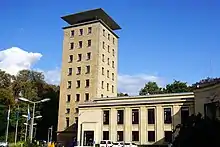
The 1962 Eurovision Song Contest was hosted in Luxembourg City. The venue chosen to host the 1962 contest was the Villa Louvigny. The building served as the headquarters of Compagnie Luxembourgeoise de Télédiffusion, the forerunner of RTL Group. It is located in Municipal Park, in the Ville Haute quarter of the centre of the city.[1]
Format
After France's entry had been performed, there was a short power failure rendering the screens dark. There also seemed to be an even shorter power failure during the Netherlands entry, when viewers around Europe only saw darkness on their television screens when the Netherlands performed. The power failure seemed to affect the Netherlands score during the voting. Nevertheless, the song turned out to be popular in Europe after the contest.[1]
Participating countries
All countries who participated in the Eurovision Song Contest 1961 also participated in this edition.[1]
Conductors
Each performance had a conductor who conducted the orchestra.[2][3]
 Finland – George de Godzinsky
Finland – George de Godzinsky.svg.png.webp) Belgium – Henri Segers
Belgium – Henri Segers.svg.png.webp) Spain – Jean Roderès
Spain – Jean Roderès Austria – Bruno Uher
Austria – Bruno Uher Denmark – Kai Mortensen
Denmark – Kai Mortensen Sweden – Egon Kjerrman
Sweden – Egon Kjerrman Germany – Rolf-Hans Müller
Germany – Rolf-Hans Müller Netherlands – Dolf van der Linden
Netherlands – Dolf van der Linden France – Franck Pourcel
France – Franck Pourcel Norway – Øivind Bergh
Norway – Øivind Bergh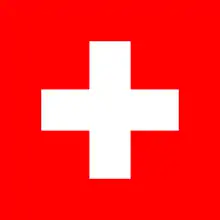 Switzerland – Cédric Dumont
Switzerland – Cédric Dumont.svg.png.webp) Yugoslavia – Jože Privšek
Yugoslavia – Jože Privšek United Kingdom – Wally Stott
United Kingdom – Wally Stott Luxembourg – Jean Roderès
Luxembourg – Jean Roderès Italy – Cinico Angelini
Italy – Cinico Angelini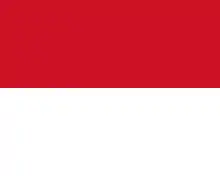 Monaco – Raymond Lefèvre
Monaco – Raymond Lefèvre
Returning artists
The contest saw the return of four artists this year, with three artists having previously participated in the 1960 contest. Camillo Felgen for Luxembourg; François Deguelt for Monaco; and Fud Leclerc making his fourth appearance for Belgium, having also been present at the 1956 and 1958 contests. Jean Philippe, having previous represented France in 1959, returned to the contest as a representative for Switzerland.[1]
Results
| Draw | Country | Artist | Song | Language[4][5] | Place | Points |
|---|---|---|---|---|---|---|
| 01 | Marion Rung | "Tipi-tii" | Finnish | 7 | 4 | |
| 02 | Fud Leclerc | "Ton nom" | French | 13 | 0 | |
| 03 | Victor Balaguer | "Llámame" | Spanish | 13 | 0 | |
| 04 | Eleonore Schwarz | "Nur in der Wiener Luft" | German | 13 | 0 | |
| 05 | Ellen Winther | "Vuggevise" | Danish | 10 | 2 | |
| 06 | Inger Berggren | "Sol och vår" | Swedish | 7 | 4 | |
| 07 | Conny Froboess | "Zwei kleine Italiener" | German | 6 | 9 | |
| 08 | De Spelbrekers | "Katinka" | Dutch | 13 | 0 | |
| 09 | Isabelle Aubret | "Un premier amour" | French | 1 | 26 | |
| 10 | Inger Jacobsen | "Kom sol, kom regn" | Norwegian | 10 | 2 | |
| 11 | Jean Philippe | "Le retour" | French | 10 | 2 | |
| 12 | Lola Novaković | "Ne pali svetla u sumrak" (Не пали светла у сумрак) | Serbo-Croatian | 4 | 10 | |
| 13 | Ronnie Carroll | "Ring-A-Ding Girl" | English | 4 | 10 | |
| 14 | Camillo Felgen | "Petit bonhomme" | French | 3 | 11 | |
| 15 | Claudio Villa | "Addio, addio" | Italian | 9 | 3 | |
| 16 | François Deguelt | "Dis rien" | French | 2 | 13 |
Scoreboard
| Voting results | ||||||||||||||||||
|---|---|---|---|---|---|---|---|---|---|---|---|---|---|---|---|---|---|---|
| Finland | 4 | 3 | 1 | |||||||||||||||
| Belgium | 0 | |||||||||||||||||
| Spain | 0 | |||||||||||||||||
| Austria | 0 | |||||||||||||||||
| Denmark | 2 | 1 | 1 | |||||||||||||||
| Sweden | 4 | 1 | 3 | |||||||||||||||
| Germany | 9 | 2 | 2 | 2 | 1 | 2 | ||||||||||||
| Netherlands | 0 | |||||||||||||||||
| France | 26 | 1 | 2 | 1 | 1 | 3 | 3 | 3 | 3 | 3 | 2 | 2 | 2 | |||||
| Norway | 2 | 2 | ||||||||||||||||
| Switzerland | 2 | 2 | ||||||||||||||||
| Yugoslavia | 10 | 3 | 3 | 2 | 1 | 1 | ||||||||||||
| United Kingdom | 10 | 2 | 2 | 2 | 1 | 3 | ||||||||||||
| Luxembourg | 11 | 3 | 1 | 1 | 3 | 3 | ||||||||||||
| Italy | 3 | 2 | 1 | |||||||||||||||
| Monaco | 13 | 3 | 2 | 1 | 3 | 1 | 3 | |||||||||||
3 points
This year marked the second jury voting system change in the contest’s history, moving away from a point per favourite song from 10-member juries to the allocation of 3, 2 and 1 points given to the top three favourite songs from each country's 10-member jurors' ratings. Below is a summary of all 3 points received in the final:
| N. | Contestant | Voting nation |
|---|---|---|
| 5 | France | Germany, Norway, Sweden, Switzerland, Yugoslavia |
| 3 | Luxembourg | Belgium, Spain, Monaco |
| Monaco | Austria, Luxembourg, Netherlands | |
| 2 | Yugoslavia | France, Italy |
| 1 | Finland | United Kingdom |
| Sweden | Denmark | |
| United Kingdom | Finland |
Broadcasters, commentators and spokespersons
Spokespersons
Listed below is the order in which votes were cast during the 1962 contest along with the spokesperson who was responsible for announcing the votes for their respective country.[6]
 Monaco – TBC
Monaco – TBC Italy – Enzo Tortora
Italy – Enzo Tortora Luxembourg – Robert Diligent
Luxembourg – Robert Diligent United Kingdom – Alex Macintosh[3]
United Kingdom – Alex Macintosh[3].svg.png.webp) Yugoslavia – Mladen Delić
Yugoslavia – Mladen Delić Switzerland – Alexandre Burger
Switzerland – Alexandre Burger Norway – Kari Borg Mannsåker[7]
Norway – Kari Borg Mannsåker[7] France – André Valmy[8]
France – André Valmy[8] Netherlands – Ger Lugtenburg
Netherlands – Ger Lugtenburg Germany – Klaus Havenstein
Germany – Klaus Havenstein Sweden – Tage Danielsson[9]
Sweden – Tage Danielsson[9] Denmark – Ole Mortensen
Denmark – Ole Mortensen Austria – Emil Kollpacher
Austria – Emil Kollpacher.svg.png.webp) Spain – Luis Marsillach
Spain – Luis Marsillach.svg.png.webp) Belgium – Arlette Vincent
Belgium – Arlette Vincent Finland – Poppe Berg
Finland – Poppe Berg
Broadcasters and commentators
Each national broadcaster also sent a commentator to the contest, in order to provide coverage of the contest in their own native language.
| Country | Broadcaster(s) | Commentator(s) | Ref(s) |
|---|---|---|---|
| ORF | Ruth Kappelsberger | ||
| RTB | French: Nicole Védrès | [10] | |
| BRT | Dutch: Willem Duys | ||
| Danmarks Radio TV | Skat Nørrevig | ||
| Suomen Televisio | Aarno Walli | ||
| Yleisradio | Erkki Melakoski | ||
| RTF | Pierre Tchernia | [10] | |
| Deutsches Fernsehen | Ruth Kappelsberger | ||
| Programma Nazionale | Renato Tagliani | ||
| Télé-Luxembourg | TBC | ||
| Télé Monte Carlo | Pierre Tchernia | [10] | |
| NTS | Willem Duys | [11] | |
| NRK and NRK P1 | Odd Grythe | ||
| TVE | Federico Gallo | ||
| Sveriges TV and SR P1 | Jan Gabrielsson | [12] | |
| TV DRS | German: Theodor Haller | ||
| TSR | French: Georges Hardy | [10][13] | |
| TSI | Italian: Renato Tagliani | ||
| BBC TV | David Jacobs | [3] | |
| BBC Light Programme | Peter Haigh | ||
| Televizija Beograd | Serbo-Croatian: Ljubomir Vukadinović | ||
| Televizija Zagreb | Serbo-Croatian: Gordana Bonetti | ||
| Televizija Ljubljana | Slovene: Tomaž Terček |
References
- "Eurovision Song Contest 1962". EBU. Retrieved 12 June 2012.
- "And the conductor is..." Retrieved 10 July 2018.
- Roxburgh, Gordon (2012). Songs for Europe: The United Kingdom at the Eurovision Song Contest. Volume One: The 1950s and 1960s. Prestatyn: Telos Publishing. pp. 291–299. ISBN 978-1-84583-065-6.
- "Eurovision Song Contest 1962". The Diggiloo Thrush. Retrieved 4 March 2012.
- "Eurovision Song Contest 1962". 4Lyrics.eu. Retrieved 16 September 2020.
- "Eurovision 1962 - Cast and Crew". IMDb. Retrieved 17 July 2020.
- Dyrseth, Seppo (OGAE Norway)
- Tchernia, Pierre et al. (18 March 1962). 6ème Concours Eurovision de la Chanson 1962 [6th Eurovision Song Contest 1962] (Television production). Luxembourg: RTL, RTF (commentary).
- "Infosajten.com". Infosajten.com. Archived from the original on 18 July 2012. Retrieved 10 August 2012.
- Christian Masson. "1962 - Luxembourg". Songcontest.free.fr. Retrieved 10 August 2012.
- "Nederlandse televisiecommentatoren bij het Eurovisie Songfestival". Eurovision Artists (in Dutch).
- Thorsson, Leif (2006). Melodifestivalen genom tiderna ["Melodifestivalen through time"]. Stockholm: Premium Publishing AB. p. 40. ISBN 91-89136-29-2.
- "Programme TV du 17 au 24 mars". Radio TV - Je vois tout. Lausanne, Switzerland: Le Radio SA. 15 March 1962.
